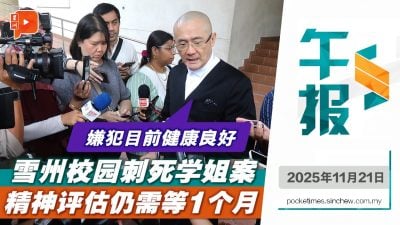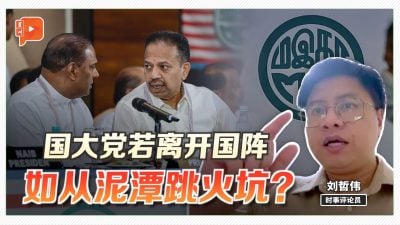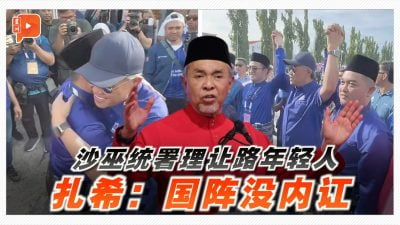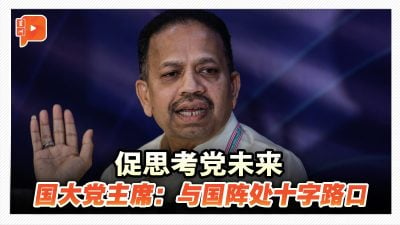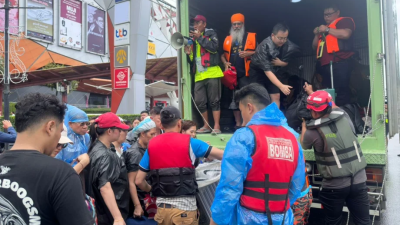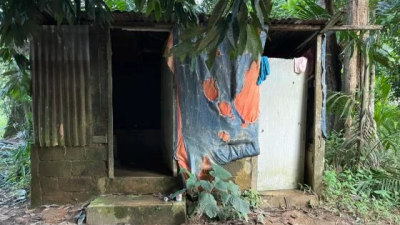PH represents a new and progressive force that would give a new lease of life to Malaysia. Compared with the self-serving and musty Umno and PN politicians, PH has a bigger pool of young and dynamic talents.
Umno-Barisan Nasional chairman Ahmad Zahid Hamidi has called the GE15 “the mother of all elections” because in his own words, if they lose, their leaders will go to jail one by one.
To put in another way, he means if Umno is back in power, they can escape from all prosecutions by interfering with the judicial process.
That was exactly what Najib Razak did, and he was thrown out in the last GE14 and subsequently jailed for the crime he had committed.
Malaysian voters of all races must ask themselves whether they want the return of these selfish politicians.
Malaysia has been experiencing ungovernable political instability for the past past years under two successive backdoor governments.
Voting in PN-PAS will only mean legitimizing the backdoor government and perpetuating this instability.
Voters must ask themselves if this is what they want.
Would they be willing to take a bold step to break with the past and vote for an alternative that will initiate the change and bring hope to Malaysia? To answer that let’s recap events of the last five years.
The short-lived Pakatan government
Compared with the last general election, GE15 seems lackluster.
Undoubtedly, GE14 had a lot more dramas and excitement: there was Najib’s cloak and dagger scandal of 1MDB and the theatrical return of the 94 year-old Mahathir to the political scene posing alongside with the opposition against his former party Umno.
The Pakatan Harapan coalition was in full offensive. The whole nation was awakened, ready for CHANGE.
Change dawned indeed. The nation liberated itself from the shackles of the Umno-dominated government that had ruled Malaysia for the last 60 years.
Euphoria surged through the hearts of many Malaysians; it was like a second Merdeka! The victory was likened to the fall of the Bastille!
A leopard does not change its spots
Unfortunately, it was short-lived. While the acclaimed leader of PH Anwar Ibrahim was in jail, the PH, for strategic considerations let in Tun Mahathir and his group of ex-Umno politicians under Bersatu.
These people turned out to be wolves in sheep’s clothing.
Mahathir was supposed to pass the premiership to Anwar. However, this would also mean endorsing the PH program of making Malaysia a truly multi-ethnic nation, diametrically contrary to Mahathir’s deep-seated ideology.
In his veins runs the racist Ketuanan Melayu blood. With Malay supremacy at sway, Malay elites can plunge their hands into the nation’s coffers at will, and the architect of this Umno culture is none other than Mahathir himself.
In reality, he and the other Malay elites would do anything to stop Anwar.
Political machination
A plan was hatched for Mahathir to lead his Bersatu MPs together with 12 Malay MPs from PKR headed by Azmin out of the PH coalition, joining hands with Umno and PAS MPs to form a Malay-Muslim “unity” government.
Due to misjudgment, Mahathir resigned as PM, and in the foray that ensued the top post went to Muhyiddin whose government was composed of a gang of traitors and mediocre political misfits.
It was the most incompetent government we have ever seen.
How can a backdoor government without a majority rule the country? Eyes rolled as we witnessed all spectacle of backstabbing, blackmailing and party hopping unfolded.
Parliamentary sessions were suspended and instability was the order of the day.
It was unsustainable. In less than 18 months, Muhyiddin’s government collapsed.
Criminals in the game
The main players who threw a spanner in the works were Najib Razak and Ahmad Zahid Hamidi, the top brass of Umno who had been charged in court for corruption.
They schemed to regain control so that their court cases could be “removed” once they got back in power.
After the fall of Muhyiddin, the same bunch of third-rate politicians formed a new government headed by an even less competent Umno personage, Ismail Sabri Yaakob.
Most of his tenure as prime minister was spent coping with harassment from Najib and Zahid who wanted an immediate dissolution of parliament, or they would withdraw their support for him.
Incompetent, self-serving and callous
The country is running on autopilot mode despite facing the grimmest economic crisis in its history due to the huge debts caused by Najib, the Covid-19 pandemic and the Ukraine-Russia war.
Except for giving monetary handouts to appease their supporters, no policies whatsoever were made to tackle the high inflation and rising cost of living.
The people live in hardship as they hear scandal after scandal of ministers involved in corruption.
During the floods that wreaked havoc last year, the absence of the government was all too glaring. NGOs rose to the occasion pouring out assistance and showing solidarity to the victims.
In short, the two backdoor administrations after the fall of the PH government will be remembered for their incompetence and callousness towards the suffering of the rakyat.
Such is the political landscape when PM Ismail Sabri succumbed to pressure by the Umno-Zahid faction (by then Najib was already in jail) to call for general elections to be held on November 19, 2022.
Will the frustration of the people translate into votes and empower Pakatan Harapan to rule again?
As it stands, there are three coalitions aspiring to form the new government, namely:
– Umno-led Barisan Nasional (BN) headed by Ahmad Zahid Hamidi;
Perikatan Nasional (PN) of Muhyiddin Yassin in a loose alliance with PAS; and
– Pakatan Harapan (PH) headed by Anwar Ibrahim.
On paper, PH should benefit from the exacerbation of corruption and abuse of power of the government.
For decades, PH has not been able to win over the Malay voters to tilt the balance because of the racial politics that has dominated the country’s electoral politics ever since Merdeka.
However difficult, the myth of the invincibility of Umno was broken in the last general elections.
Although Umno has managed to crawl back to power through treachery, racial coercion and deceit, in the eyes of the Malays, it is not the same Umno any more.
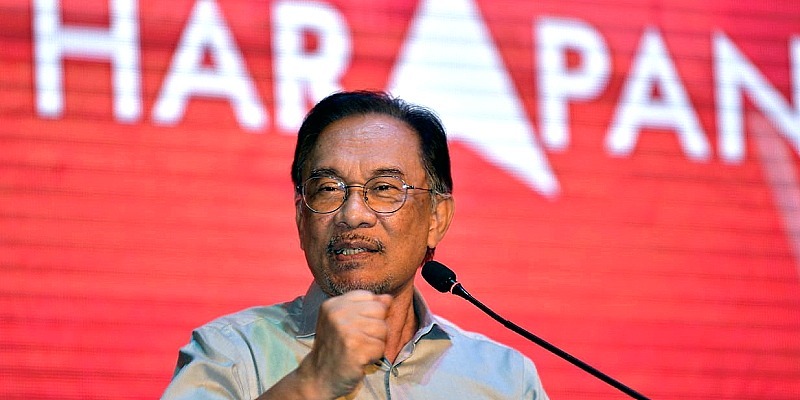
Not the same Umno anymore
Umno was at its height during the 22-year reign of Tun Mahathir; its rot and fall also started with him.
It was so easy to become not only rich, but filthy rich, just by becoming an Umno “leader.” Money was the name of the game.
As corruption became increasingly rampant, power, or abuse thereof, became an indispensable tool.
Umno has lost its raison d’être to help the Malays. Umno leaders, joined by PAS ulamas, even preach that there is nothing to be ashamed of being corrupt so long as it is Malay!
With values descending to this level, it is not surprising that Umno has little moral standing. This is evident in the two governments following the fall of PH.
Based on their victories in Johor and Melaka state elections, election pundits predict that Umno will win big.
This optimism nevertheless may not be realized in a nationwide election which chooses the government and prime minister.
The “poster boy” of Umno in the campaign is the incumbent PM Ismail Sabri. He remains a “boy” who commands little respect in the party and will not grow to be the PM.
The Umno man who wants to be PM the most is none other than the party’s president and BN chairman Ahmad Zahid Hamidi, who is presently facing court charges on 43 counts.
Zahid’s motivation for a snap election is to become PM and interfere in the judicial process, much like his predecessor Najib Razak.
It may seem naive but Zahid has already prepared the ground by not nominating Umno stalwarts who risk standing in his way. It’s not coincidental that they happen to be the allies of Ismail Sabri!
The picture is clear: with Ahmad Zahid at the helm in GE15, Umno is no longer the efficient election machinery that used to awe its opponents.
There is no common program, no leadership, no unity. Each politician is protecting his or her own turf with a personal agenda.
Other Malay parties
Since the fall of Umno in the last election, many of its leaders and members have crossed to Bersatu, an offshoot of Umno. They are actually abang-adik fighting for the same Malay electorate.
Organizationally, Bersatu is weaker than Umno, and their leaders are misfits from Umno wanting to try their luck in new pastures.
However, one cannot ignore their presence as they serve as an alternative to traditionally Umno supporters who, rightly or wrongly, view Pakatan as a threat to the Malays.
PAS is the longest existing Islamic party in Malaysia. Ever since they joined the backdoor governments and tasted power, they have become more materialistic, money-minded, power-crazy, racist and religiously narrow-minded.
They can only draw their support from the same pool of Malay electorate as Umno and Bersatu.
PAS has its own sphere of influence which is stable, steady but not able to expand.
In this election they have formed a coalition with Bersatu called Perikatan Nasional.
There is another Malay-centric coalition called Gerakan Tanah Air (GTA), which is basically a one-man-show “coalition” formed by none other than Tun Dr Mahathir.
With the “betrayal” tag on his forehead, no other party seems to be interested in aligning with him. Period.
All the above parties are exclusively Malay-Muslim parties. Because of the big number of Malay constituencies, whichever party wins the majority of these seats will have the chance to form the government.
Previously, they were Umno’s strongholds, but due to its poor record of governance, the contest is now open.
This time the unknown factor comes from the hundreds of thousands of young voters who are voting for the first time.
The strategic thinking new PH leader, Rafizi Ramli, has been tasked to woo them. It will augur well for the PH if he succeeds.
Young voters and new political culture
The most encouraging political development in recent years has been the increasing number of youths from all ethnic groups coming forward to participate in politics.
These people are aware that our society needs to do away with old politics and old politicians whose aim is to perpetually hold on to power to enrich themselves at the expense of the rakyat.
They organized food and assistance for those in distress during the pandemic and floods. They spoke out against injustices and the abuse of power in street demonstrations. A group of them formed a multi-ethnic political party called MUDA (Malaysian Union of Democratic Alliance).
Hopefully they will produce a new political culture and program for a New Malaysia through their electoral struggle.
PH and Anwar Ibrahim will make the difference
By far in this GE15, the most organized and dynamic group in the election campaign is Pakatan Harapan, a coalition of PKR, DAP and Amanah.
They carry a clear message to the voters that all the indictments against the present government are pointless if they continue to vote in the same people who have been causing their miseries and the degradation of the nation.
They need to vote in a new government which will implement a new system of governance, a new set of economic policies in which all the poor, regardless of race, will be taken care of, and all the ethnic groups will help one another to develop together.
In short, the message is that the old system must go!
Besides, PH represents a new and progressive force that would give a new lease of life to Malaysia. Compared with the self-serving and musty Umno and PN politicians, PH has a bigger pool of young and dynamic talents.
And compared with PM hopefuls from the other camps, namely Zahid Hamidi, Ismail Sabri and Muhyiddin Yassin, PH’s designated PM Anwar Ibrahim is by far the most principled, perseverant, experienced, inspiring, intellectually superior, articulate and internationally known.
He is a better choice to lead the nation out of misery and decline.
Vote for change
This election is actually about CHANGE, and the chance is there only if Malaysians turn out in big numbers as in GE14.
The Malay voters can actually see the big corruption in the present system but they are still sentimental and not courageous enough to endorse change. It is estimated that only 20% of Malays would vote for PH.
Unfortunately, owing to gerrymandering, there are many Malay seats in the Peninsula. Therefore, PH needs a massive support from their traditional supporters, the non-Malays.
Before the dissolution of parliament, the mood of non-Malays was one of frustration and disillusionment because of the sudden collapse of the PH government. They saw the hope for change dashed.
Now as the campaigns move into the final week, the mood is changing. More and more of them see the stake in this election; their hope has risen as PH gains popularity.
Hopefully, they will turn around and be an agent of change or they would regret the missed opportunity in the 1999 general election.
(Charles Chia is a Social Activist.)
ADVERTISEMENT
ADVERTISEMENT







